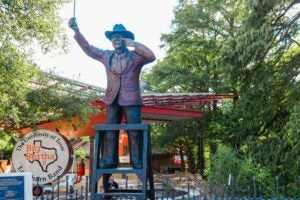AUSTIN, Texas—The current issue of the Southwestern Historical Quarterly examines three aspects of the history of African-American Texans: domestic employee/employer relations, the role of the African-American middle class in black labor movements and the history of segregation at The University of Texas at Austin. The Quarterly is published by the Texas State Historical Association, which is based at UT Austin.
An article titled “Without Pride or Apology: The University of Texas at Austin, Racial Integration, and the Barbara Smith Case,” examines the administration’s barring of African-American student Barbara Louise Smith from appearing in a 1957 campus production of “Dido and Aeneas” because of her race. Smith, now Barbara Conrad, graduated from UT and went on to an accomplished operatic career. In recent years, she has received a Distinguished Alumnus Award from the University, has been a visiting artist and a faculty member in the College of Fine Arts. She also spoke at the Tenth Annual Heman Sweatt Symposium on Civil Rights in 1996.
Dr. Lewis L. Gould, the recently retired professor emeritus in American history, co-wrote “Without Pride or Apology” with Melissa R. Sneed. The authors discuss the administration’s actions in the context of the political climate of the day. The various responses among faculty, students and the general public to the University’s actions also are examined. The project grew out of a term paper on the subject submitted by Sneed in Gould’s undergraduate seminar.
Judith W. Linsley, research assistant at the McFaddin-Ward House Museum in Beaumont, Texas, provides a window into the complex relationships between early 20th century white employers and their African-American domestic employees. In “Main House, Carriage House: African-American Domestic Employees at the McFaddin-Ward House in Beaumont, Texas, 1900-1950,” Linsley reveals a complicated connection that both reinforced and defied social mores of the time.
Dr. Ernest Obadele-Starks’ “Black Labor, the Black Middle Class, and Organized Protest along the Upper Texas Gulf Coast 1883-1945,” sheds light on the impact class had on the black labor movement. Obadele-Starks is an assistant professor of history at Texas A&M University in College Station. In “Black Labor,” he highlights several members of the African-American middle class, the roles they played in the black labor movement and the ways in which their actions were received.
The oldest scholarly journal in Texas, now in its 103rd volume, the Southwestern Historical Quarterly features articles, book reviews, pictorial features and historical news on Texas four times a year. For more information, or to purchase a copy of the journal, call the Texas State Historical Association at 512/471-1525. To learn more about African-American history in Texas, search The Handbook of Texas Online at http://www.tsha.utexas.edu.



